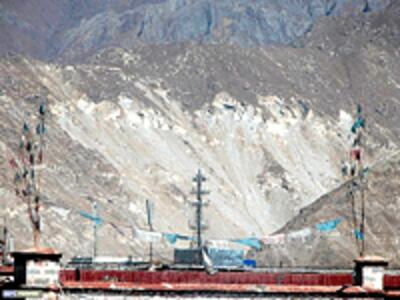
HONG KONG—Hundreds of villagers in the Tibet Autonomous Region (TAR) of western China are facing off against armed security forces at the site of a planned gold mine on what the Tibetans consider a sacred mountain, witnesses say.
“The Tibetan protesters are worried,” said one local man, who said he was one of eight organizers of the protest.
“The police, the soldiers, and the miners are threatening to move ahead with the mine...They have said they will force their way through and go to the site.”
...The Tibetans...are vowing to resist even if it means sacrificing their lives."
Resident<br/>
Tibetans have historically worshiped the site, conducting rituals there in the event of drought, residents say. Now a Chinese mining and lumbering firm, Zhongkai Co., has been authorized to excavate the area, and locals are protesting.
Another Tibetan man said hundreds of protesters had gathered peacefully at Ser Ngul Lo [“Year of Gold and Silver” in Tibetan] in the Tsangshul subdistrict of Lhara village, Markham county, Chamdo prefecture.
“Now there are so many soldiers too. I would say more than 300 of them,” he said.
Another local Tibetan said security forces had cut off the protesters from the rest of the village.
“They blocked all phones and even cellphones aren’t reachable,” the man said.
“We can’t reach any of the protesters. Today another four vehicles with roughly 30 to 40 soldiers in them went to the protest site. But the Tibetans all put religious books on their heads and are vowing to resist even if it means sacrificing their lives,” he said.
A Tibetan employee at the nearby Markham [in Chinese, Mangkang] Hotel said the protest had been continuing for several months.
“There is trouble at the mine,” she said, adding, “There are more than 300 armed police...The county government also sent more than 100 people. It’s been three or four months and is still going on.”
An official at the Markham county Public Security Bureau declined to comment on the mine or the protest.
Asked if the demonstration had been quelled, he replied, “We are not authorized to say. You should ask [someone] higher-up. It’s inconvenient for us to comment.”
'Ready to die'
An employee of Zhongkai Co., contacted by telephone, also declined to comment.
“I am not clear on the situation at the mine,” the employee said.
Pema Thinley, vice chairman of the TAR Communist Party, was sent to Markham to try to convince the local population to accept the mine, one of the protesters said.
But residents continued their demonstration, and Pema Thinley was escorted back to Lhasa, the regional capital, on April 5.
On May 16, a contingent of police and security forces arrived, but as many as 500 Tibetans blocked the road leading to the planned mine, one of the residents said.
“The Tibetans slept on the road day and night and the Chinese group stayed in a school nearby. They were trying to convince us to stop protesting,” he said, adding: “The Tibetans declared that they are ready to die to protect the sacred hill.”
Original reporting by Lobsang Choephel for RFA’s Tibetan service and Ding Xiao for RFA’s Mandarin service. Tibetan service director: Jigme Ngapo. Mandarin service director: Jennifer Chou. Translation by Karma Dorjee and Jennifer Chou. Edited and produced in English by Sarah Jackson-Han.
